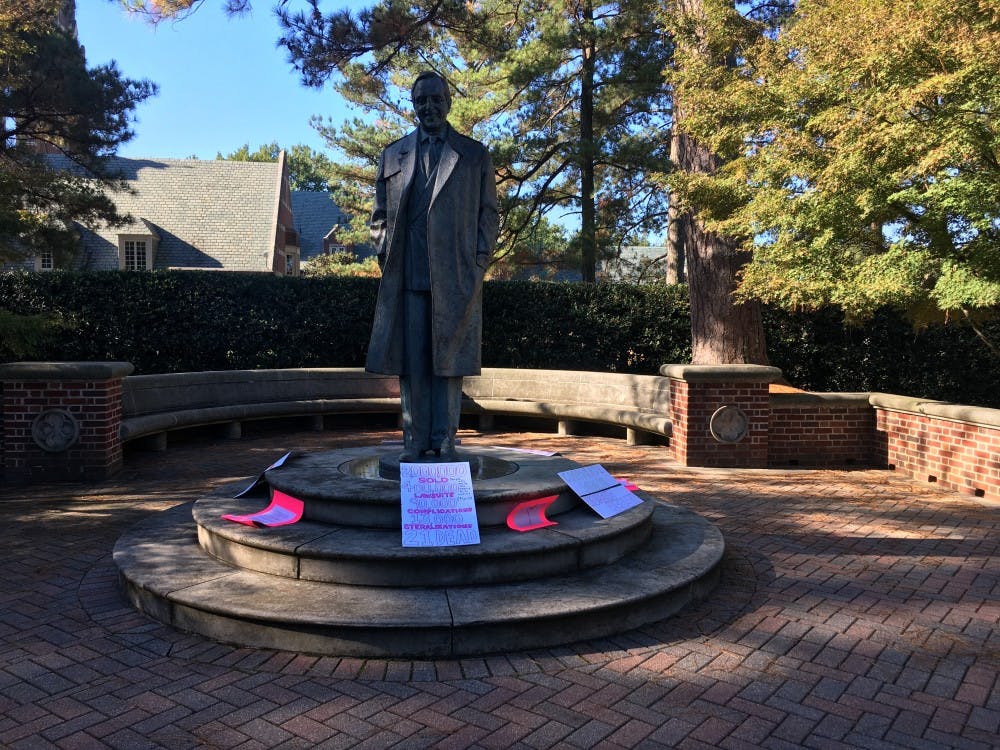For members of the University of Richmond's Planned Parenthood Generation Action chapter, raising awareness about UR's history prompted a demonstration by the organization last Thursday at the E. Claiborne Robins statue outside of Weinstein Hall.
Planned Parenthood Generation Action is a network of student activists across 300 U.S. campuses, and its mission includes raising public awareness about reproductive health and rights, according to the group’s website.
Claire Tate, sophomore, president of UR's Generation Action chapter, said that this demonstration had not been intended to shame E. Claiborne Robins, but rather to raise awareness about how his company, the A.H. Robins Pharmaceutical Company, profited off the sale of contraceptives that led to more than 200,000 women testifying against the company in a class-action lawsuit.
“This is definitely in our domain,” Tate said. “Reproductive justice is about access to birth control and access to having a child, and he took that away from so many people.”
The Dalkon Shield is an intrauterine device (IUD) that was sold by the A.H. Robins Pharmaceutical Co. from 1970 until the U.S. Department of Health, Education and Welfare ordered federally-funded, family-planning clinics to stop prescribing the device in 1974.
By mid-1975, at least 21 women had died, and at least 13,000 women had become sterile or infertile as a result of using the Dalkon Shield, according to reports by the Washington Post.
Tate said that the distribution of the Dalkon Shield had contributed to a larger societal issue still prevalent today where the autonomy over women’s reproductive rights is threatened.
“Autonomy over one’s reproductive health is something that has been taken away from people with uteruses and vaginas,” Tate said. “That autonomy was taken away when the Dalkon Shield went on the market and wasn’t vetted for these complications.”
Tate added that the responsibility to address the history of the Dalkon Shield belongs to student activists on campus.
“I don’t think that the school or administration has a responsibility, more than I feel like Generation Action has a social responsibility to address it,” Tate said.
Robins was the head of A.H. Robins Pharmaceuticals Co. when the Dalkon Shield was sold on the market, according to the Virginia Historical Society.
In 1969, one year before the Dalkon Shield hit the market, Robins donated $50 million to UR, the largest donation at the time given by a living benefactor to an American university, according to UR's website.
Enjoy what you're reading?
Signup for our newsletter
Sophia Bruce, sophomore, member of Planned Parenthood Generation Action, said the financial contributions that Robins had made to UR were central to the University’s history, but that it was important for UR to acknowledge the full history of the donations that Robins made.
“The reason that we are here today is because of E. Claiborne Robin’s donation,” Bruce said. “He’s really considered a father figure of UR, so them advertising the money that he donated but not acknowledging the risks that came with it is ignorant of the institution.”
Bruce also added that the history of the Dalkon Shield contributed to how reproductive justice can be discussed on campuses today.
“It’s really important to continue to discuss reproductive justice because we’re nowhere near having entire reproductive rights," Bruce said. "This just shows one case where a man was not realizing his actions and harming women through it."
Meghan Miller-Brown, sophomore, president of Spiders for Life, an anti-abortion group on campus, told the Collegian in an emailed statement that the organization did not have an official stance on birth control and declined to comment on the demonstration held by Planned Parenthood Generation Action.
Tate said that she would like for her organization to collaborate with others on campus and continue the discussion of reproductive justice.
“In years to come, if we make it a goal to hold discussions about this on campus, I think it would be really important to our campus history,” Tate said.
The A.H. Robins Pharmaceutical Company was purchased by American Home Products in 1989 after accepting a buyout offer in January 1988, according to the Virginia Historical Society. The company is now called Pfizer Inc. and operates a plant in Richmond, according to the company's website.
Contact news writer Bri Park at brianna.park@richmond.edu.
Support independent student media
You can make a tax-deductible donation by clicking the button below, which takes you to our secure PayPal account. The page is set up to receive contributions in whatever amount you designate. We look forward to using the money we raise to further our mission of providing honest and accurate information to students, faculty, staff, alumni and others in the general public.
Donate Now



